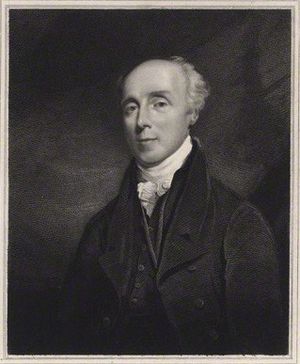Francis Wrangham facts for kids
Francis Wrangham (born June 11, 1769 – died December 27, 1842) was an important person in England. He was a church leader, known as the Archdeacon of the East Riding. He was also a famous writer, translator, and a big supporter of ending slavery. He collected many books too.
About Francis Wrangham's Life
Francis Wrangham was born on June 11, 1769, in a place called Raysthorpe, near Malton in Yorkshire. His father, George Wrangham, was a successful farmer. Francis went to Hull Grammar School and then studied at Cambridge University, first at Magdalene College and later at Trinity Hall. He did very well in his studies.
In 1793, he hoped to become a Fellow at Trinity College, which is a special teaching position. However, he was not chosen. He tried to challenge this decision in court, but the judge agreed with the college. They felt he was not the right fit for their group, even though he was a very worthy person.
Wrangham became a priest in 1793. He then became the rector of Hunmanby in Yorkshire. In those days, talented church leaders often held several church jobs at once. They would hire other priests to do the daily work. Francis Wrangham was very successful because he was smart and had good connections. He was a tutor to the Duke of Manchester's brother, and the Duke's family supported him throughout his life.
Besides being the vicar of Hunmanby, he held many other important church roles. He was a Fellow of the Royal Society and an Archdeacon in different areas. He was also a Prebendary in York and Chester.
Francis Wrangham was a member of the Roxburghe Club, a group for book collectors. He is buried in Chester Cathedral, where there is a special monument built for him.
Francis Wrangham's Writings and Ideas
Francis Wrangham was a well-known poet, essayist, and translator. He translated old Greek and Latin books. He was a strong supporter of many good causes. He believed in ending slavery, giving women a good education, and supporting Catholic rights. He also worked to create charity schools, free libraries, and charity hospitals.
He wrote a poem in 1794 called The Restoration of the Jews. This poem won a prize from Cambridge University. It talked about Jewish people returning to the Land of Israel. The poem also had a very strong message against slavery:
157: And thou bethink thee, Albion, ere too late,
158: Queen of the isles and mart of distant worlds,
159: That thou like Tyre (with hands as deep in blood,
160: Warm from the veins of Africa, and wealth
161: By arts more vile and darker guilt acquir'd)
162: Shalt meet an equal doom. The day will rise...
Other poems by Wrangham that won prizes included 'The Holy Land' and 'Sufferings of the Primitive Martyrs'. His first book of poems was special because it included translations by famous poets like Coleridge and Wordsworth. Some of his other poetry books were The Raising of Jaïrus' Daughter (1804) and Poetical Sketches of Scarborough (1813).
Wrangham translated many works from ancient Greek, Latin, French, and Italian. These included The Lyrics of Horace (1821) and parts of Homer's Iliad and Odyssey. He also wrote many sermons and articles about politics. He regularly wrote for magazines like Blackwood's Magazine and the Gentleman's Magazine.
Francis Wrangham was a big book collector. A list of his books was published in 1824. Two years later, he published his own list of the English books in his library.
Francis Wrangham's Family Life
Francis Wrangham was married two times. His first wife was Agnes Creyke. They married in 1799. Sadly, she died in 1800, but their daughter survived.
In 1801, Wrangham married Dorothy Cayley. She brought him a good income. They had two sons and three daughters together.
Here are some of his children:
- Agnes Frances Everilda, his daughter from his first marriage, married Robert Isaac Wilberforce. He later took over her father's role as Archdeacon of the East Riding.
- Lucy Charlotte, his oldest daughter from his second marriage, married Henry Raikes. Their son was Henry Cecil Raikes, who became a politician.
- Philadelphia Frances Esther, his third daughter from his second marriage, married Edward William Barnard.
His first son, George Walter, became a vicar. His second son, Digby Cayley Wrangham, became a lawyer and a politician.


